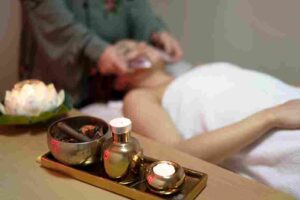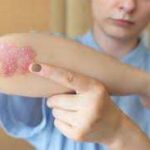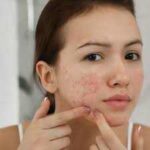Eczema is a skin disorder in which patches of skin become itchy, inflamed, cracked, and rough. A person diagnosed with eczema experiences redness and itchiness in their body. It can affect people of all age groups, making it difficult to find an effective treatment for eczema or vicharchika.
Treatment for eczema focuses on balancing the body’s energies and restoring its natural state. In this complete guide, we will explore the different treatments for eczema and how these procedures can help alleviate the symptoms of this skin disease.
Signs and Symptoms of Eczema
Eczema, a chronic skin condition, is common in young children but can affect adults too. The signs and symptoms of eczema vary from person to person according to age and the severity of their condition.
The most common symptoms of eczema are dry and scaly skin, which leads to itching and redness. People can experience these symptoms in any part of their body. In the infected area, you may also feel pain and see blood.

Other symptoms include rashes on the swollen skin, which vary depending on your skin colour. People diagnosed with the disease also experience redness around the eyes and small raised bumps on the body.
Complications due to Eczema
As soon as eczema progresses in the body, complications also arise. In many cases, people diagnosed with chronic skin diseases like eczema can experience various physical and psychological problems. Scratching the infected skin makes the patient vulnerable to other bacterial, viral, and fungal infections. Below are some of the complications associated with eczema:
- Scalp issues
- Sleep-related problems
- Mental health issues such as anxiety and depression
- Lack of self-confidence
- Eczema Herpeticum
- Neurodermatitis
With early detection and the right treatment for eczema, one can lower the risk and prevent its progression.
Treatment for Eczema
According to Ayurveda, every person has three energies, which are known as doshas, and these doshas must be in balance for good health. The treatment for eczema involves maintaining the out-of-balance doshas through a natural approach. It focuses on purifying the blood and removing toxins from the body.
Panchakarma Therapy for Eczema Treatment
Treatment for eczema is mainly done through Panchakarma therapy. This is a very effective method to treat skin diseases like eczema. This includes medicines and procedures like consuming medicated ghee, vomiting, sweating, and receiving whole-body massages. The Panchakarma treatment helps remove toxins from the body and supports the immune system.

Herbal Remedies for the Treatment of Eczema
Eczema can also be treated with various herbs. The antibacterial and antimicrobial properties present in herbs are helpful in treating skin diseases.
Diet and Lifestyle Changes in the Treatment of Eczema
A diet rich in whole, unprocessed foods and low in refined carbohydrates, sugar, and dairy can help to reduce the symptoms of eczema. In terms of other lifestyle changes, reducing stress, avoiding triggers, and getting adequate sleep, can help to alleviate the symptoms of eczema.
Conclusion
Eczema can be a challenging condition to live with, but Ayurvedic treatment offers a holistic approach to managing its symptoms. Whether through diet changes, herbal supplements, or topical options, Ayurveda offers various treatments for eczema. With the best healthcare experts and qualified staff, Ayursparsh Clinic is well-known for treating eczema and other such skin diseases including psoriasis, and acne.
It is important to consult a qualified Ayurvedic practitioner to ensure you get the best treatments. Dr Rashmi Patil is well-known for treating eczema. She ensures to provide an individualised treatment plan that’s right for you.




